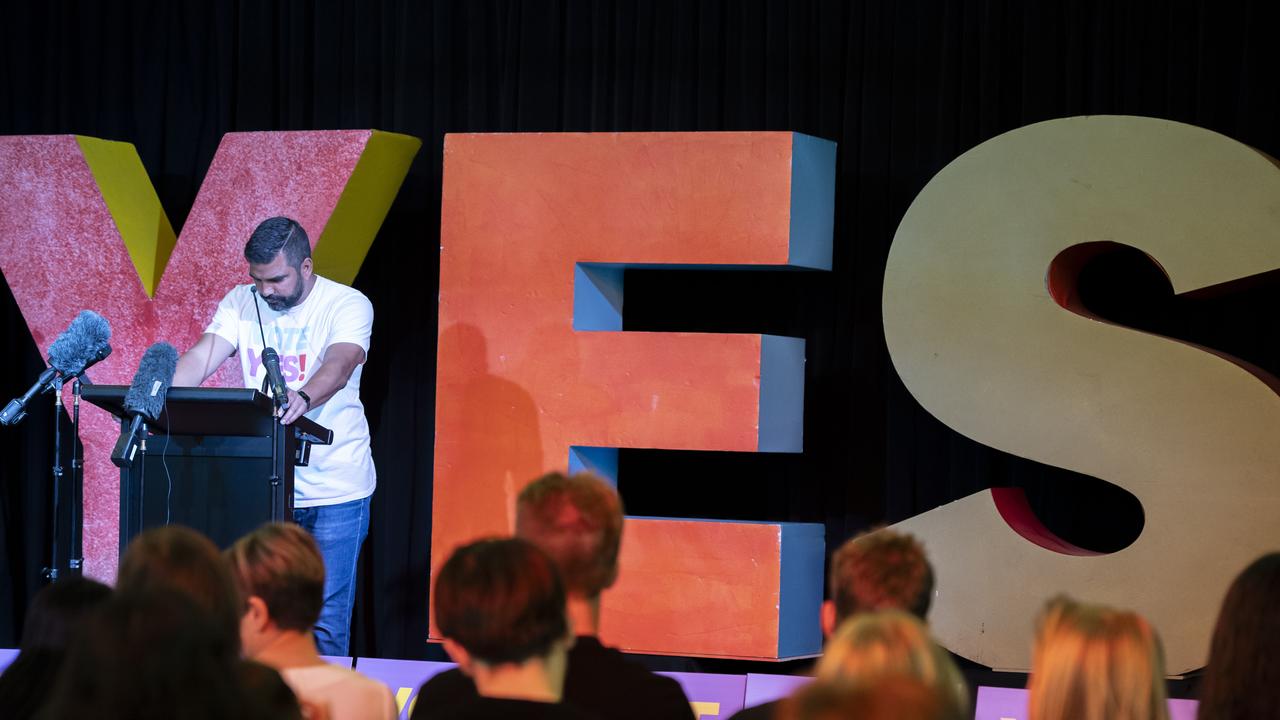Indigenous Yes leaders to end week of silence after Voice defeat
A week on from the bruising defeat of the Voice to Parliament referendum, Indigenous leaders will soon break their silence.

Indigenous leaders devastated by the outcome of last Saturday’s Voice to Parliament referendum are set to end their week of silence this weekend, but what comes next remains unclear.
The referendum – the result of years of consultation and the express request of Indigenous Australians through the 2017 Uluru Statement from the Heart – was overwhelmingly defeated last Saturday.
Every state voted No, and nationally the referendum was defeated 60 per cent to 40 per cent.
Anthony Albanese and Indigenous Australians Minister Linda Burney have spent the week maintaining their disappointment, but respect for the result, and reiterating their commitment to closing the gap.
The Prime Minister said it was a “difficult time” for Indigenous Australians, noting that many remote communities overwhelmingly voted for the Voice.
In the wake of the results, leaders called for Aboriginal and Torres Strait Islander flags to be lowered to half mast and a “week of silence” to be observed to allow grieving.
When that week ends, those leaders are expected to outline next steps, but as of Friday those details were yet to be confirmed.

Whatever comes next follows a parliamentary sitting week in which the Coalition sought to pressure the government on Indigenous affairs.
Question time was full of questions from the Coalition about whether Labor still stood by its commitment to implement the Uluru Statement from the Heart “in full”, given that includes a Makarrata Commission for truth-telling and treaty.
On Wednesday, Opposition Leader Peter Dutton asked Mr Albanese whether it was his position that he “doesn’t know if he personally supports Makarrata, treaty and truth-telling until he speaks with the referendum working group”.
In response, Mr Albanese said he “accept(ed) the outcome of the referendum” and respected that Indigenous people were taking the time to mourn.
A day later, Mr Albanese and the government rejected a push by Mr Dutton to support a royal commission into child abuse in Indigenous communities and an audit into Indigenous spending programs.

Mr Dutton, in attempting to suspend standing orders in the House of Representatives, said Australians had voted for a new way forward and were “demanding action”, adding that Mr Albanese was “weak” and “indecisive”.
Mr Albanese labelled it a “political stunt” designed to “whip up outrage”, adding that he would not make child abuse a partisan issue.
He accused Mr Dutton of having “nothing positive to offer the country”.
It was a sentiment shared by renegade Liberal backbencher Bridget Archer – a survivor of child sexual abuse – who crossed the floor to vote against her party.
Mr Dutton said he believed Ms Archer had made “a mistake” in voting against the inquiry, and he couldn’t “understand why anyone would vote against a royal commission into what I think is one of the country’s most serious issues”.

Ms Archer later told The Guardian that Mr Dutton appeared to be “weaponising” child abuse for “political advantage”, adding that she would support a royal commission into child sexual abuse if it were to probe the prevalence of the problem in all parts of the community, not just Indigenous communities.
“We don’t want to divide the country by race, yet we’re singling out abuse in Indigenous communities,” she said.
“It’s very difficult to see (the motion) as anything other than weaponising abuse for some perceived political advantage.”
Mr Dutton and his Indigenous Australians spokesperson Jacinta Nampijinpa Price were also lashed by Indigenous leaders, some of whom broke the week of silence to warn the Coalition that the safety of children “should not be politicised or used as a platform to advance a political position”.
“It is frustrating and disappointing to hear the Opposition Leader and Senator Price repeating the same claims and calls they made earlier this year, again with no evidence and no credible solutions,” a statement signed by the likes of the Coalition of Peaks, NACCHO, Lowitja Institute, and Reconciliation Australia said.
“Child abuse is far too prevalent in Australia full stop. Singling out Aboriginal families and communities is harmful and puts ideology before evidence”.
The Grace Tame foundation also joined the pile-on, saying it “strongly rejects” Mr Dutton’s call because child sexual abuse “should never be used for political purposes”.
Grace Tame said Mr Dutton had wrongly singled out First Nations peoples who were grieving the outcome of the referendum.
“I find it incredibly ironic that the Leader of the Opposition was so strongly against the Voice to Parliament for reasons including that he did not want to divide a country by race, yet is now calling for a royal commission that singles out First Nations communities,” she said.
Earlier in the week, Mr Dutton had formally retracted his offer to hold a second referendum purely on recognising Indigenous Australians in the Constitution, saying Australians were tired of referendums.
Meanwhile, in Queensland, Premier Annastacia Palaszczuk was forced to admit the state’s Path to Treaty was unlikely to go ahead without bipartisan support after Opposition Leader David Crisafulli withdrew his support in the wake of the referendum’s result.

Queensland had the highest No vote in the country – 69 per cent – with only three inner-city Brisbane electorates, held by the Greens, voting Yes.
Mr Crisafulli on Sunday reiterated his support for truth and treaty but by Thursday said the LNP would no longer support the “divisive” plan and would abandon it if it won government next October.
“Pursuing a Path to Treaty will lead to greater division, not reconciliation, and I cannot support that,” he said.



